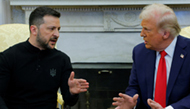▶ 7 Months, 10 Days In Captivity.
THE CAR’S ENGINE roared as we crossed into the open Afghan desert. I was seated in the back between two Afghan colleagues who were accompanying me on a reporting trip when armed men surrounded our car and took us hostage.
A gunman in the passenger seat turned and stared at us as he gripped his Kalash-nikov rifle. No one spoke. I glanced at the bleak landscape and feared we would be dead within minutes.
It was last November 10, and I had been headed to a meeting with a Taliban commander named Abu Tayyeb, along with an Afghan journalist, Tahir Luddin, and our driver, Asad Mangal. The commander had invited us to interview him outside Kabul for a book I was writing about Afghanistan and Pakistan.
The longer I looked at the gunman in the passenger seat, the more nervous I became. His face showed little emotion. I thought of my wife and family and was overcome with shame. An interview that had seemed crucial hours earlier now seemed absurd and reckless.
Eventually, we arrived at a crude mud-brick home perched in the center of a ravine. I was put in some type of washroom the size of a closet. After a few minutes, the guards opened the door and pushed Tahir and Asad inside. We stared at one another in relief. About 20 minutes later, a guard opened the door and motioned for us to walk into the hallway.
“No shoot,” he said, “no shoot.”
For the first time that day, I thought our lives might be spared. The guard led us into a living room decorated with maroon carpets and red pillows. I sat down across from a heavyset man with a patu-a traditional Afghan scarf-wrapped around his face. “I’m a Taliban commander,” he announced. “My name is Mullah Atiqullah.”
For the next seven months and 10 days, Atiqullah and his men kept the three of us hostage. We were held in Afghanistan for a week, then spirited to the tribal areas of Pakistan, where Osama bin Laden is thought to be hiding.
Atiqullah worked with Sirajuddin Haqqani, the leader of one of the most hard-line factions of the Taliban. The Haqqanis and their allies would hold us in territory they control in North and South Waziristan.
During our time as hostages, I told our captors that we were journalists who had come to hear the Taliban’s side of the story. I told them that I had recently married and that Tahir and Asad had nine young children between them. I wept, hoping it would create sympathy, and begged them to release us. All of my efforts proved pointless.
Over those months, I came to a simple realization. After seven years of reporting in the region, I did not fully understand how extreme many of the Taliban had become. Living side by side with the Haqqanis’ followers, I learned that the goal of the hard-line Taliban had become vastly ambitious. Contact with foreign militants in the tribal areas appeared to have deeply affected many young Taliban fighters. They wanted to create a fundamentalist Islamic emirate with Al Qaeda that spanned the Muslim world.
I knew Pakistan turned a blind eye to many of their activities. But I was astonished by what I encountered firsthand: a Taliban mini-state that flourished with impunity.
What follows is the story of our captivity there.
I flew from Helmand to Kabul on Sunday, November 9, to meet with Tahir, who worked for The Times of London and was known as a journalist who could arrange interviews with the Taliban.
I slept poorly the night before the interview with Abu Tayyeb, the Taliban leader. I left two notes behind. One gave Carlotta Gall, the Kabul bureau chief of The New York Times, the location of the meeting and instructed her to call the United States Embassy if we did not return by late afternoon. The other was to my wife, Kristen, in case something went wrong.
I met Tahir and Asad, a friend he had hired to work as a driver and lookout. From the car, I sent Carlotta a text message with Abu Tayyeb’s phone number. I told her to call him if she did not hear from me. If something went wrong along the way, Abu Tayyeb and his men would rescue us. Under Afghan tradition, if a guest is threatened, it is the host’s duty to shelter and protect him.
We arrived at the meeting point but none of Abu Tayyeb’s men were there. Tahir called Abu Tayyeb, who instructed us to continue down the road. Moments later, two gunmen ran toward our car shouting commands in Pashto, the local language. The gunmen opened both front doors and ordered Tahir and Asad to move to the back seat.
Tahir shouted at the men in Pashto as the car sped down the road. The gunman in the passenger seat shouted commands.
“They want to know your nationality,” Tahir said. I hesitated. Being an American was disastrous, but I thought lying was worse. If they later learned I was American, I would instantly be declared a spy.
“Tell them the truth,” I told Tahir. “Tell them I’m American.”
Tahir relayed my answer and the burly driver beamed, raising his fist and shouting a response in Pashto. Tahir translated it for me: “They say they are going to send a blood message to Obama.”
By the time I met face to face later that day with Atiqullah, our kidnapper, I still did not know which Taliban faction had abducted us.
With Tahir translating, we explained that we had been invited to Logar Province to interview Abu Tayyeb, the Taliban commander. I said I had worked as The Times’s South Asia correspondent from 2002 to 2005. I described articles I had written during the war in Bosnia and told him that Serbian Orthodox Christians had arrested me there after I had exposed the massacre of Muslims.
Atiqullah remained unmoved. He denied our request to call Abu Tayyeb or a Taliban spokesman. He controlled our fate now, he said.
Several hours after sunset, we were hustled into a small station wagon.
“We have to move you for security reasons,” said Atiqullah, who was sitting in the driver’s seat, his face still concealed behind a scarf. Over the next hour, Atiqullah promised to do his best to protect us. I promised him money-“millions”-and prisoners.
For the next four days, we lived in another small dirt house.
One day Atiqullah announced that we would have to walk through the mountains. We hiked for 11 hours. I told myself that we were walking into southern Afghanistan, not Pakistan. I told myself we would survive.
THE ISLAMIC EMIRATE
No Place for Americans
Instead, on November 18, we arrived in Pakistan’s tribal areas, an isolated belt of Taliban-controlled territory. We were now in “the Islamic emirate”-the fundamentalist state that existed in Afghanistan before the 2001 American-led invasion. The loss of thousands of Afghan, Pakistani and American lives and billions in American aid had merely moved it a few kilometers east, not eliminated it.
I had pitied captives imprisoned here. It was arguably the worst place on earth to be an American hostage. The United States government had virtually no influence and was utterly despised.
Our first Pakistani home was in Miram Shah, the capital of North Waziristan. Two large sleeping rooms looked out on a small courtyard. One even had a small washroom, separate from the toilet, for showering. All day, a parade of Pakistani militants stopped by the house to stare at us. Among them was a local Taliban commander who introduced himself as Badruddin. He was the brother of Sirajuddin Haqqani, who led the Haqqani network, one of the most powerful Taliban factions in the region. Miram Shah was its stronghold.
Badruddin, who appeared to be in his early 30s, said he was preparing to make a video of us to release to the media.
I asked if Tahir and I could speak alone with Atiqullah, and I told him we should not make the video. The American and Afghan governments were more likely to agree to a secret prisoner exchange, I said, than a public one.
I told him it would be easier to get prisoners from the Afghan- run prison outside Kabul, known as Pul-i-Charkhi. If the Taliban demanded prisoners from the American- run detention centers at Guantanamo Bay, Cuba, and Bagram, Afghanistan, they would never succeed.
I was not worth that much, I told him, and he should compromise. I also wanted to spare my family the pain of seeing me in a video. To my surprise, Atiqullah agreed.
“I am one of those kinds of people,” he said at one point. “I am one of those people who like to meet in the middle.”
Tahir, Asad and I would be allowed to call our families that night to prove we were alive, he said. Atiqullah told me to emphasize that he wanted to reach a deal for ransom quickly. He continued to cover his face with a scarf. To me, that meant he did not want to be identified because he planned to release us.
Later I spoke to my wife for the first time in nine days. I had expected panic or tears, but she sounded collected . Her words “It’s going to be all right” would linger in my mind for months. Her composure would sustain me.
After the calls we were taken to a new house, and I was again surprised by the good conditions. It had regular electricity, and warm water for washing.
Atiqullah said he needed to return to Afghanistan, but two of his men stayed behind to guard us. “I will return in 7 to 10 days,” he promised .
That week, to help us pass the time, we received a shortwave radio and a board game called checkah. To my amazement, the guards even brought me English-language Pakistani newspapers. Instead of beating us as I expected, our captors were trying to meet some of our needs.
But reasons for optimism would be overtaken by harsh realities. For the next several nights, a stream of Haqqani commanders overflowing with hatred for the United States and Israel visited us, unleashing blistering critiques that would continue throughout our seven months in captivity.
They said large numbers of civilians had been killed in Afghanistan, Iraq and the Palestinian territories in aerial bombings. Muslim prisoners had been physically abused and sexually humiliated in Iraq. Scores of men had been detained in Cuba and Afghanistan for up to seven years without charges.
To Americans, these episodes were aberrations. To my captors, they were proof that the United States was a hypocritical power that flouted international law.
When I told them I was an innocent civilian who should be released, they responded that the United States had held and tortured Muslims in secret detention centers for years. Commanders said they themselves had been imprisoned, their families ignorant of their fate. Why, they asked, should they treat me differently?
Their hatred for the United States seemed boundless.
Ten days passed, but Atiqullah did not return as promised. Badruddin now seemed to be in charge. He moved us to a far smaller, dirtier house. The food was unclean and made me sick. Any sense of urgency about our release seemed to be fading. Before leaving, Badruddin told me the Taliban would not kill me.
“You are the golden hen,” he said.
Several days before Christmas, Atiqullah finally returned. He announced that he had spectacular news. “We are here to free you,” he said, wearing no scarf over his face for the first time. “We have come here to release you.”
At first, I was euphoric. Then, later that night, the conversation turned menacing.
The American military had mounted an operation to arrest Abu Tayyeb on the morning that we were to interview him, Atiqullah said, referring to the Taliban leader we had been traveling to meet when we were kidnapped.
Shocked, I told Atiqullah I knew nothing about a military operation.
He replied that I was a spy, along with other employees of The Times in Afghanistan. Talk of our imminent release now seemed farcical.
The following morning, Atiqullah insisted that there was, in fact, a deal. At one point, he said we would be exchanged within “days.” By this point, I began to doubt everything he said. Then I learned that he had lied to us from the beginning.
Tahir and Asad told me that Atiqullah was, in fact, Abu Tayyeb. They had known since the day we were kidnapped, they said, but dared not tell me. They asked me to stay silent as well. Abu Tayyeb had vowed to behead them if they revealed his true identity.
Abu Tayyeb had invited us to an interview, betrayed us and then pretended he was a commander named Atiqullah.
I was despondent and left with only one certainty: We had no savior among the Taliban.
2 They drive through Wana and on to a house in Miram Shah, a stronghold of the Haqqanis, a hard-line Taliban faction.
3 OVER THE NEXT 7 MONTHS They are taken to a series of homes in the tribal areas, where the Taliban have established a mini-state since being driven from Afghanistan in 2001.
THE NEW YORK TIMES
A HAQQANI REALITY
Winning Hearts and Minds
My captivity confirmed suspicions that the Haqqanis oversaw a sprawling Taliban mini-state in the tribal areas with the de facto acquiescence of the Pakistani military. The Haqqanis were so confident of their control of the area that one day they took me-a person they considered to be an extraordinarily valuable hostage-on a three-hour drive in broad daylight to shoot a scene for a video outdoors.
Over the winter, I would come to know the reality the Haqqanis had created.
My captors assailed the West for killing civilians, but they celebrated suicide attacks orchestrated by the Taliban that killed scores of Muslim bystanders. They bitterly denounced missionaries, but they pressed me to convert to their faith. They complained about innocent Muslims being imprisoned by the United States, even as they continued to hold us captive.
Yet in our day to day existence, when commanders were absent, some of our guards showed glimpses of humanity. Those moments gave us hope .
Tahir, Asad and I had received comforting letters from our families through the International Committee of the Red Cross. But I hadn’t spoken to my wife, Kristen, in three months.
Finally, on February 16, Abu Tayyeb drove me to a remote location and allowed me to call her. The Taliban told me to give her the number of their cellphone and have her call us back. They were demanding $7 million at that point but were too cheap to pay for the phone call.
“This is my last call,” I said to her, repeating what they had told me to say. “This is our last chance.”
Abu Tayyeb promised that he would reach a settlement with my family. Then, as he had many times before, he left without doing so. My conversations with him during his brief visit left me doubtful that he would ever compromise in a case involving an American.
THE TALIBAN AND THE DRONES
Staying Alive
On March 25, missiles fired by an American drone obliterated their target a few hundred meters from our house in a village in Pakistan’s tribal areas.
Two weeks earlier our captors had moved us from Miram Shah, the capital of the North Waziristan tribal agency, to Makeen, a town in South Waziristan that was a stronghold of the leader of the Pakistani Taliban, Baitullah Mehsud. The region teemed with Uzbek, Arab, Afghan and Pakistani militants.
Later, I learned that one guard called for me to be taken to the site of the drone attack and beheaded as a video camera captured the moment. The chief guard overruled him.
The Taliban assailed the drone attacks, and my captors expressed more hatred for President Obama than for President Bush. They bitterly criticized the Obama administration for increasing the missile attacks in Pakistan’s tribal areas and the number of American troops in Afghanistan.
With each passing month, we felt increasingly forgotten and at the mercy of the young guards who lived with us. In mid-March, one of our guards arrived with a DVD player. After that, watching jihadi videos became the guards’ favorite pastime. They were little more than grimly repetitive snuff films.
I feared that the videos were brainwashing our driver, Asad. After we moved to Makeen, he seemed more friendly toward the guards and began carrying a Kalashnikov they had given him. He also stopped smoking, which the guards said was forbidden under Islam. He was only doing what he needed to do to stay alive, I told myself.
In late April, a surprise visit by Abu Tayyeb raised our hopes that our freedom was being negotiated. Then he told me I would need to cry for a new video he wanted to make. I stared at Tahir. If I refused, the Taliban might kill him or Asad to drive up a potential ransom payment. I hated the thought of my wife, Kristen, and my family seeing such a video, but Tahir was the father of seven children, and Asad the father of two. I agreed to make it.
I told Abu Tayyeb we would “be here forever” if he did not reduce his demands. “You are a spy,” Abu Tayyeb declared. “You know that you are a spy.”
I told him I was a journalist. Then, I tried to shame him in front of his men.
“God knows the truth,” I said. “And God will judge us all.”
Abu Tayyeb disappeared the following morning. We spent the next six weeks in a new house in a remote village in North Waziristan.
In early June, Abu Tayyeb reappeared and announced that the American government was offering to trade the seven remaining Afghan prisoners at Guantanamo Bay, Cuba, for us. I told him that was ridiculous.
He smiled. If I made one more video, he said, we would be released. Ashamed of my previous video and convinced that he was lying yet again, I refused.
Once again, Abu Tayyeb repeated his order, and I said no. I knew it was reckless, but standing up to him felt enormously liberating after months of acquiescing. Sensing that Abu Tayyeb and his men were about to beat me, Tahir and Asad told me to make the video. “Just do it,” Tahir said.
I finally relented. But at the end of the video, I included a message I had wanted to relay since the day we were kidnapped. “However this ends, Kristen and all my family and friends should live in peace with yourselves,” I said. “I know you have all done absolutely everything you can to help us.”
THE ESCAPE
Rope, and a Plan
It was 1 a.m. on Saturday, June 20, in Miram Shah, the capital of the North Waziristan tribal agency in Pakistan. After seven months and 10 days in Taliban captivity, Tahir and I had decided to make a run for it.
We had arrived at the Miram Shah compound the first week of June. It was our ninth location in the tribal areas. As I had done when we arrived in each new place, I swept floors and picked up trash to create a sense of order. It was then that I found a car towrope. Thinking we might be able to use the rope during an escape, I hid it under an old shirt and pants.
In the days that followed, I tried to think of ways we could flee. When the guards let us sit on the roof with them at dusk, I noticed that it was surrounded by a wall about 1.5 meters high. If we could hoist ourselves over it, I thought, we could use the rope to lower ourselves to the street.
At the same time, Tahir surveyed the area around the house when the guards took him with them to buy food and watch cricket games once or twice a week. He determined that the compound was closer to Miram Shah’s main Pakistani militia base than any other house we had been held in.
Tahir and I kept our conversations brief about how we could escape, worrying that the guards or Asad would overhear us. Several weeks earlier, we decided we could no longer trust Asad. That afternoon, Tahir and I made a gut-wrenching decision to leave without him, fearing that he would tell the guards of our escape plans.
Our rupture with Asad had become the darkest aspect of an already bleak captivity, although later I would learn that he, too, had escaped.
In truth, I expected our escape attempt to fail quickly. Instead, to my amazement, our plan actually worked. That night, after Tahir and I made it to the courtyard, I retrieved the rope and we crept up a flight of stairs leading to the roof.
Shortly thereafter, for the first time in seven months, I walked freely down a street.
We made it to the Pakistani base. For the first time that night, it occurred to me that we might actually succeed.
The powerlessness I had felt for months began to fade. We were achingly close to going home.
About an hour later, a soldier arrived with a phone card, and I wrote my home number on a white slip of paper. The captain dialed the phone on his desk and handed me the receiver. On the second try, Kristen picked up.
“David?” she said, breathlessly.
“David?”
“Kristen,” I said, savoring the chance to utter the words I had dreamed of saying to her for months.
“Kristen,” I said, “please let me spend the rest of my life making this up to you.”
“Yes,” she said. “Yes.”
스마터리빙
more [ 건강]
[ 건강]이제 혈관 건강도 챙기자!
[현대해운]우리 눈에 보이지 않기 때문에 혈관 건강을 챙기는 것은 결코 쉽지 않은데요. 여러분은 혈관 건강을 유지하기 위해 어떤 노력을 하시나요?
 [ 건강]
[ 건강]내 몸이 건강해지는 과일궁합
 [ 라이프]
[ 라이프]벌레야 물럿거라! 천연 해충제 만들기
 [ 건강]
[ 건강]혈압 낮추는데 좋은 식품
[현대해운]혈관 건강은 주로 노화가 진행되면서 지켜야 할 문제라고 인식되어 왔습니다. 최근 생활 패턴과 식생활의 변화로 혈관의 노화 진행이 빨라지고
사람·사람들
more많이 본 기사
- 마지막 토요일도 도심 집회… “내란 단죄” vs “윤 어게인”
- 쿠팡 ‘정부 반박’ 영문성명 미묘한 표현차… ‘잘못된 비난’ 부각
- “SD서 최고 활약 김하성, 2024시즌만큼만 쳐줘도 ATL 3승 더한다” ESPN 극찬
- 보수 야당 “의원직 사퇴하고 법심판 받아야”…김병기에 총공세
- 뉴욕시 폭설에 항공기 수천편 취소·지연 사태
- 특검, ‘로저비비에’ 김기현 부부 기소…尹 뇌물 수사는 경찰로
- 황하나, 남편 사망→캄보디아서 남친과 출산..귀국 후 구속 ‘파란만장’
- 국힘 “신천지로 통일교 특검 물타기 안돼”…與 “성역없이 규명”
- IS 확실했나…트럼프 ‘성탄절 나이지리아 폭격’ 갸우뚱
- “솔직히 자신은 없죠” 3루수 GG 송성문, 유격수도 아닌 외야라니... 생존 본능 발동할까
- 황하나, 마약 도피 중 캄보디아서 출… 1
- 올해 美 기업 파산신청 증가… “관세·고물가·고금리 원인”
- 오윤아 “子, 학교 떨어져 잘못 키웠나..방치 했나 싶어 눈물”
- “2025년 높이뛰기는 우상혁과 커의 무대” 세계육상연맹 조명... 우상혁도 “커와 계속 경쟁해야 해”
- 러, 젤렌스키 미국행 앞 대규모 공습…우크라도 러에 드론 공격
- “아동 수출국 오명 벗는다” 70년 만에 해외입양 중단
- “올해 최고 주목받은 테크 거물은 머스크 아닌 래리 엘리슨”
- “올해 최고 주목받은 테크 거물은 머스크 아닌 래리 엘리슨”
- 트럼프 “소말릴란드 아는 사람 있나?”…이스라엘 승인에 ‘NO’
- 韓정부, 노란봉투법 해석 지침 공개… 하청 임금·근로조건 좌우하면 ‘진짜 사장’
- 이혁재가 또.. “빌려간 3억원 안 갚아” 사기 혐의로 피소
- ‘서해 공무원 피격 은폐’ 혐의 서훈… 2
- ‘김건희에 로저비비에 선물’ 김기현 부인 특검 재출석…곧 기소
- [이지 사이언스] “온난화 막으려면 세계인구 44% 식단 바꿔야…문제는 소고기”
- ‘손흥민 감격의 첫 우승’ 올해 축구계 기적 톱8 선정 ‘선수로는 유일’
- ‘NCT 탈퇴’ 태일, 성폭행 혐의로 결국 감옥行..징역 3년 6개월 확정
- 곽도원, 음주운전 3년 만 복귀각..스토리제이컴퍼니 측 “미팅 했지만 계약 단계 아냐”
- 8시즌 뛰고 ML 역대 17위 “오타니 GOAT 될 것”, ML 역대 50인 선정
- 효연, 소녀시대 수입 서열 공개 “1위 나 아냐..윤아·태연이 더 벌어”
- 한파에 고드름이 주렁주렁… 서울 이번 겨울 첫 한파주의보
- 국제은값 폭등에 개인투자자들 銀투자 대거 유입
- 러, 트럼프-젤렌스키 종전회담 직전 … 1
- “도시 빈민에 전한 성탄의 온기”
- 찰스 3세, 내년 방미 추진…트럼프에 英왕실 ‘매력 공세’될까
- 쏟아지는 갑질·특혜 의혹… 버티는 김병기, 속 끓는 정청래
- LA 등 서부에 사흘째 폭우…동부엔 폭설 예보
- 복음으로 세상 섬길 인재 배출
- 물류거점창고에 불체자 8만명 수용 추진
- 한미장학재단에 3만달러 영구장학금 기탁
- 소싯적 ‘치기어린’ 주소 “굿바이”…지메일 주소변경기능 도입
- ‘마약 혐의’ 남양유업 3세 황하나 구속… “증거인멸 우려”
- ‘역대 최연소’ 백악관 대변인 레빗,… 1
- 16세로 성장한 버클리 문학, 성대한 송년 파티
- “출생시민권은 사기”⋯ 이민 2세대 공격 초점 맞춘 트럼프
- 특검, 김건희 ‘금품 수수’ 무더기 기소… 뇌물 여부는 경찰 몫으로
- 작년 운용자산 5조5천억달러…갑부들의 ‘패밀리오피스’ 월가 새 강자로
- [새해부터 이렇게 달라진다] 최저임금 또 오르고… 유급 병가는 더 확대
- “온 세상에 희망·평화의 빛 스며들길”
- ‘정보 유출자 셀프 조사’ 경찰에 늦게 알린 쿠팡… 증거인멸 의혹
- 쿠팡, 자체 조사결과 발표후 첫거래일 급등…뉴욕증시서 6%↑
1/5지식톡

-
 미 육군 사관학교 West Poin…
0
미 육군 사관학교 West Poin…
0https://youtu.be/SxD8cEhNV6Q연락처:wpkapca@gmail.comJohn Choi: 714-716-6414West Point 합격증을 받으셨나요?미 육군사관학교 West Point 학부모 모…
-
 ☝️해외에서도 가능한 한국어 선생님…
0
☝️해외에서도 가능한 한국어 선생님…
0이 영상 하나면 충분합니다!♥️상담신청문의♥️☝️ 문의 폭주로 '선착순 상담'만 진행합니다.☎️ : 02-6213-9094✨카카오톡ID : @GOODEDU77 (@골뱅이 꼭 붙여주셔야합니다…
-
 테슬라 자동차 시트커버 장착
0
테슬라 자동차 시트커버 장착
0테슬라 시트커버, 사놓고 아직 못 씌우셨죠?장착이 생각보다 쉽지 않습니다.20년 경력 전문가에게 맡기세요 — 깔끔하고 딱 맞게 장착해드립니다!장착비용:앞좌석: $40뒷좌석: $60앞·뒷좌석 …
-
 식당용 부탄가스
0
식당용 부탄가스
0식당용 부탄가스 홀세일 합니다 로스앤젤레스 다운타운 픽업 가능 안녕 하세요?강아지 & 고양이 모든 애완동물 / 반려동물 식품 & 모든 애완동물/반려동물 관련 제품들 전문적으로 홀세일/취급하는 회사 입니다 100% …
-
 ACSL 국제 컴퓨터 과학 대회, …
0
ACSL 국제 컴퓨터 과학 대회, …
0웹사이트 : www.eduspot.co.kr 카카오톡 상담하기 : https://pf.kakao.com/_BEQWxb블로그 : https://blog.naver.com/eduspotmain안녕하세요, 에듀스팟입니다…
케이타운 1번가
오피니언

새해 더 중요해지는 노동법 준수

연말연시, 안전하고 차분하게
 캐슬린 파커 워싱턴포스트 칼럼니스트
캐슬린 파커 워싱턴포스트 칼럼니스트 [캐슬린 파커 칼럼] 지미 라이의 마지막 희망
 유경재 나성북부교회 담임목사
유경재 나성북부교회 담임목사 [한국춘추] 미국의 힘
 전병두 서북미수필가협회 회원
전병두 서북미수필가협회 회원 [금요단상] 비자 발급
 박일근 / 한국일보 수석논설위원
박일근 / 한국일보 수석논설위원 [지평선] 스님의 주례사
 신상철 / 고려대 고고미술사학과 교수
신상철 / 고려대 고고미술사학과 교수 [미술 다시보기] 신의 모습을 닮고자 한 예술가
 스티브 강 전 한인민주당협회 회장
스티브 강 전 한인민주당협회 회장 [스티브 강 ‘인사이드 미국’] 2026 중간선거: 트럼프 지지율 하락이 말해주는 것
 김홍일 케이유니콘인베스트먼트 대표
김홍일 케이유니콘인베스트먼트 대표 [기고] 안정의 기준은 어떻게 제도가 되었나
1/3지사별 뉴스

물류거점창고에 불체자 8만명 수용 추진
도널드 트럼프 행정부가 이민자 구금·추방을 효율화하기 위해 전국 물류거점 창고에 8만명 규모의 수용시설 확보를 추진한다고 24일 워싱턴 포스트…
‘학자금 상환’ 안하면 임금압류

“온 세상에 희망·평화의 빛 스며들길”
가자지구와 우크라이나에서의 전쟁, 고립과 불평등으로 세상이 어지러운 가운데 워싱턴 지역 각급 한인교회와 성당들이 성탄절을 맞아 일제히 예배와 …
“연말은 스트레스·새해 결심은 없다”

“올해 최고 주목받은 테크 거물은 머스크 아닌 래리 엘리슨”
올해 미국에서 가장 주목받은 기술업계 거물은 일론 머스크 테슬라 최고경영자(CEO)가 아닌 래리 엘리슨 오라클 창업자·회장이라고 블룸버그 통신…
[새해부터 이렇게 달라진다] 최저임금 또 오르고… 유급 병가는 더 확대

오늘 하루 이 창 열지 않음 닫기 























































.png)


댓글 안에 당신의 성숙함도 담아 주세요.
'오늘의 한마디'는 기사에 대하여 자신의 생각을 말하고 남의 생각을 들으며 서로 다양한 의견을 나누는 공간입니다. 그러나 간혹 불건전한 내용을 올리시는 분들이 계셔서 건전한 인터넷문화 정착을 위해 아래와 같은 운영원칙을 적용합니다.
자체 모니터링을 통해 아래에 해당하는 내용이 포함된 댓글이 발견되면 예고없이 삭제 조치를 하겠습니다.
불건전한 댓글을 올리거나, 이름에 비속어 및 상대방의 불쾌감을 주는 단어를 사용, 유명인 또는 특정 일반인을 사칭하는 경우 이용에 대한 차단 제재를 받을 수 있습니다. 차단될 경우, 일주일간 댓글을 달수 없게 됩니다.
명예훼손, 개인정보 유출, 욕설 등 법률에 위반되는 댓글은 관계 법령에 의거 민형사상 처벌을 받을 수 있으니 이용에 주의를 부탁드립니다.
Close
x